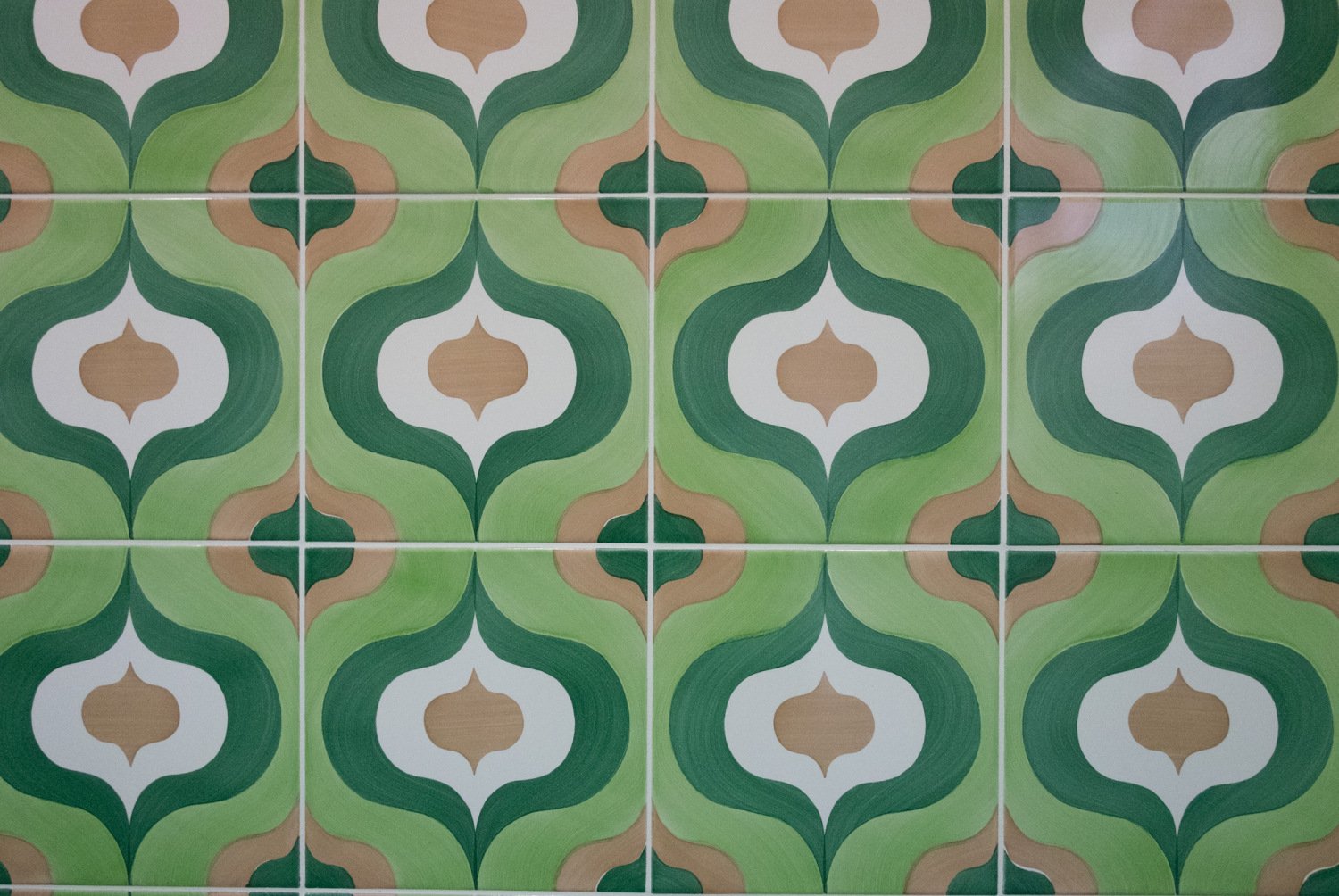
Zellige tiles, which originate from Morocco’s ancient mosaic tradition, are one of the most popular kitchen and bathroom tile trends today. Beyond their trendy appeal, zellige tiles have a distinct beauty and handcrafted appearance, making them a long-lasting home trend. These handmade tiles are renowned for their vibrant colors, geometric patterns, and meticulous craftsmanship. Aside from their beauty, zellige tiles have a long history and tradition that contribute to their unique appeal. This exploration will equip you with the knowledge you need to decide if you are ready to get in on this exclusive tile trend.
Zellige tiles are a traditional type of Moroccan tile. The term zellige is derived from an Arabic word meaning “little polished stone.” These tiles served as the foundation for the intricate mosaic patterns found in Moroccan architecture and design, both historic and modern.
Authentic zellige tiles are ceramic tiles made from a special clay. Each tile is made by hand using a unique cutting, shaping, and polishing technique. This handcrafted process results in slight imperfections in each tile, which contribute to their unique charm. Zellige tiles have a glazed surface, which produces luminous colors and adds depth and character.
Zellige Tile Style Guide
Tile trends change over time, but the zellige tile trend appears to be particularly durable due to its elegant style, handmade aesthetic, and versatility. See how some homeowners and designers have embraced the trend.
Green Zellige Tile in a Neutral Kitchen

Colorful zellige tile provides a striking contrast in a neutral colored space, making the design more balanced, vibrant, and dynamic. This soft green zellige tile provides an instant focal point in this all white kitchen and is the ideal backdrop for the vent hood and bright brass wall sconces.
Tone-on-Tone Home Bar

Because of their slightly variable color and luminosity, zellige tiles are excellent for creating a tone-on-tone look. Designer Elle du Monde used black zellige tile as a backsplash for this black cabinet home bar. The black tiles give the bar enough glowing depth to keep the design interesting and unexpected.
Vertical Zellige Tiles

These blush pink zellige tiles elevate the style of this simple white kitchen. Laying them vertically gives the kitchen a more modern look, but it also visually expands the space.
Ombre Bathroom Wall

Rather than try to work around the color differences in zellige tiles, this designer embraced the ombre look by using zellige tiles in three different color variations. This gives the bathroom a contemporary look but also pays homage to the mosaic history of zellige tile.
A Luminescent Glow

Zellige tiles feature an iridescent quality that makes them appear to glow in soft light. This makes them especially effective, even in neutral colored spaces, at creating dynamism and interest.
Scalloped Zellige Tiles

Zellige tiles are available in a variety of shapes. The most popular are square tiles, which come in a variety of sizes, but you can also find rectangle, fish scale, cross, star, hexagon, and trapezoid shapes.
All-Encompassing Zellige Tile

This designer used blue zellige tiles to cover the entire bathroom from floor to ceiling. This may result in monotony with some tile types, but the variability and imperfections of zellige tiles provide inherent interest.
Considerations Before Using Zellige Tiles
We all agree that zellige tiles are striking, but due to their distinctive style and nature, they will not work in every application or space. Here are some ideas to consider before implementing them in your home.

Inherent Imperfections
Authentic zellige tiles are still handmade in Morocco. This means that no two tiles are exactly alike in size, depth, or color. Therefore, if you want a tile wall with flawless uniformity, zellige tiles are not for you. Instead, zellige tiles produce a tile wall or floor where corners do not exactly meet and there are slight color changes across the tiles.
People who use zellige tile should embrace its imperfections. One important tip from tile manufacturers is to mix the tiles from all the boxes you get for your project. This will spread out the slight color and shape differences in the boxes.
Maintenance
Glazed zellige tiles require just a regular cleaning with mild soap or stone cleaner and water in order to keep them looking beautiful for years. Wipe up all spills quickly, and keep the tile free from abrasives that might scratch or mar the surface of the tiles. Slight imperfections in the tiles cause certain corners to stick out, so be aware of this while you clean. Never use harsh chemicals or abrasives because these will damage the glaze. Glazed zellige tiles do not need to be resealed; however, unglazed zellige tiles require regular application of a sealer.
Adhesive and Grout
Many designers and tile professionals recommend that zellige tiles be installed with no grout line visible. Zellige tiles are installed on a substrate covered in a thin-set adhesive. Because of their irregular shape, some contractors opt to use wedge-shaped spacers to get the tiles as evenly spaced as needed through the laying process. Allow the thin-set to cure and apply an unsanded grout with a tile float at a 45-degree angle. Allow to sit for 10-20 minutes, and then clean and wipe down according to the manufacturer’s instructions. Be sure to clean and buff the tiles completely to avoid grout haze on the tiles.
Where to Use Them
Zellige tiles appear delicate, but they are surprisingly durable. They are heat and moisture resistant and can withstand wear and tear. Zellige tile manufacturers insist that these tiles can be used anywhere, including walls, floors, fireplaces, and outdoors. This is true with a few caveats. Although zellige tiles are durable, some have slightly raised edges that can cause problems on certain floors.
The raised edges of zellige tiles are prone to scratches and other damage, so they are best used in low-traffic areas. Some people also claim that the glazing on zellige tiles makes them slippery. Use small-scale zellige tiles on floors so that the grout lines can provide additional traction.
Finding Zellige Tile
It is easy to find authentic zellige tiles, but it is vital that you know what you should look for. Choose a reputable supplier with a proven track record for distributing zellige tiles. Some popular distributors include Cle Tile, Riad Tile, Zia Tile, and Badia Design. Some suppliers may provide you with documentation or a certificate that verifies the traditional and handmade origin of their tiles. Look for the hallmarks of authenticity, including a handmade look, glossy and “cracked” surface glazing, a variation of colors, and being made using traditional methods in Morocco.
Timeless or Trendy?
Zellige tiles are currently one of the most popular tile trends in kitchen and bath design. While trend directions are always difficult to predict, zellige tile has characteristics that argue for its timeless appeal. Zellige tiles have been around for hundreds, if not a thousand, years. The fact that we are still using them today is proof of their timelessness. These tiles are handcrafted from natural materials. Their authenticity distinguishes them as a classic and elegant choice. So, while we can not predict whether zellige tiles will be used in all of the latest kitchen and bathroom designs in ten years, we can say that they will always be beautiful and will not be disappearing from kitchens and bathrooms any time soon.
Credit : Source Post






